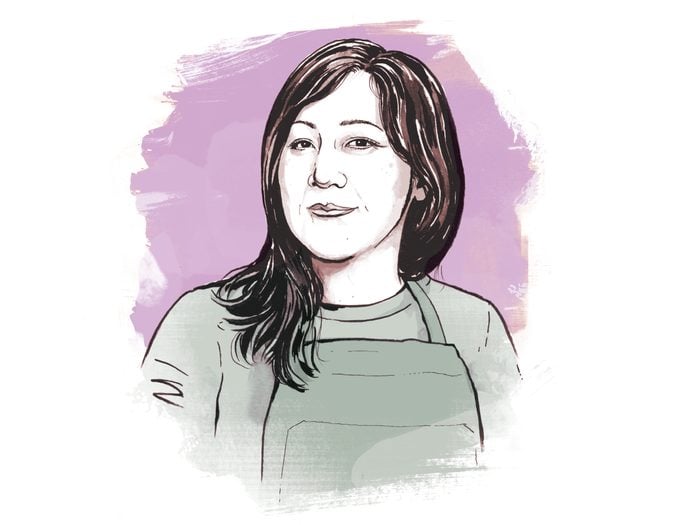How This Meal Delivery Company Is Keeping New Moms Fed

The founder of Feeding Mama on supporting new parents with nourishing, nutritious doorstep delivery.
When Vancouver-based mom and software project manager Mona Stilwell gave birth to her twin boys in 2014, her mother hired a Taiwanese private chef (who also happened to have a nursing background) to make sure Stilwell ate nutritious food as she recovered from giving birth. Every day for a whole month, Stilwell received a delivery of three healthy, hearty and traditional meals that were meant to help her heal after giving birth. “I was so busy and freaking out over having twins that I didn’t even think about food,” says Stilwell. “As I entered my third trimester, my mom basically told me that she had hired this person and I couldn’t say no.”
It wasn’t until she went back to work the following year that she realized how many new parents wished they could receive the same kind of support. There are postpartum traditions around the world centred around community care within villages and families, but “it wasn’t put into a consumer-packaged service,” Stilwell says. So, in 2018, she launched Feeding Mama to provide new moms in the Vancouver area with delicious and nourishing meal deliveries that follow the traditional Chinese practice of “sitting the month.”
Sitting the month, or zuò yuè zi, is a form of postpartum care followed by practioners of Traditional Chinese Medicine (TCM). The practice has been traced as far back as the year 960 and there are documents from over 2,000 years ago that highlight postpartum care rules that have been passed down for generations. Typically, postpartum mothers are taken care of by their relatives: grandmas, moms, and aunties help with everything—including household tasks and childcare—so the new mom can focus only on resting and recovering.
“You basically don’t leave your home for 30 days, you don’t take care of all the [other] children, you’re not cooking, you’re not cleaning the house, you’re not taking a shower, you’re not getting your hair or body wet, and you have to eat warm foods,” explains Stilwell.
These rules all stem from TCM—hair washing, for example, is forbidden because, it’s believed, you might catch a cold. (It’s also why having a fan or the air conditioning on is a no-no.) There are also specific, traditional dishes that are meant to be eaten, containing ingredients like ginger, chicken, or liver to boost health and fulfill nourishment needs. Foods that are anti-inflammatory and full of iron, protein, and vitamin C are emphasized—the first to help replenish iron lost from bloodshed during childbirth and in the weeks that follow, and the rest to provide energy for a lactating parent who may be up at all hours, consoling the baby and nursing or pumping.
Stilwell grew up in Richmond, B.C., but she was born in Malaysia and her mother’s family was from China and her dad’s family was from Macau and Portugal. This blending of cultures has influenced her business: Feeding Mama uses traditional ingredients, and also leans on modern nutritional sciences to design and deliver meal plans to new parents in the greater Vancouver area—from broths, teas, and lactation cookies to dinners of steamed salmon with bok choy and ginger rice quinoa. Feeding Mama’s soups and meals are chock-full of ingredients like lentils (which are high in iron) and sweet potatoes (which have a ton of vitamin C).
“I grew up in a very Chinese family, so many of the things we eat are for function, even though it’s bitter—like Chinese medicine is the most horrible-tasting thing you can consume, but it’s good for you,” she says. “So, I thought, there must be a way to make very functional foods really tasty and incorporate more of the foods I’ve been exposed to as a foodie growing up in Vancouver.”
Aside from providing clients with delicious and nutritious meals, Stilwell also hopes to bring a community care aspect to the business. “Every time I send a delivery, I write a little note of encouragement,” she says. “Things like ‘your recovery matters,’ ‘be gentle with yourself’—things I wish someone had said to me in a non-judgmental, unconditional love kind of way.”
Often, new parents don’t—or can’t—allow themselves much time to rest. They aren’t prepared for how relentless newborn care is, Stilwell says, and the grandparents often forget how hard the early days were: It can be difficult to feed yourself well if you’re trapped under a nursing or sleeping baby, or when you often only have one hand free. Simply getting to a grocery store with a newborn who’s sleeping-and-feeding-and-pooping in two-hour increments, around the clock, can feel logistically impossible. Plus, parents may live far away from their relatives or don’t have the space to accommodate long family visits, so there isn’t anyone to help cook meals for them.
This is where a service like Feeding Mama can step in. And while the practice of sitting the month has existed in China and the Chinese diasporic community for a thousand years and similar practices are common in other East Asian cultures, Stilwell believes that there’s room to adapt the tradition for all parents. “It’s a tradition, but the food is not traditional,” she says.
Signature meal plans start at $200 (and can cost as much as $2,600, depending on how many meals you want, and for how long). Gift cards from $25. feedingmama.ca
This story is part of Best Health’s Preservation series, which spotlights wellness businesses and practices rooted in culture, community and history. Read more from this series here:
Meet Sisters Sage, an Indigenous Wellness Brand Reclaiming Smudging
This Canadian Soap Brand is Rooted in Korean Bathhouse Culture
Sharing Chinese Herbal Soups and Teas, Steeped in Tradition
Get more great stories delivered straight to your inbox by signing up for the Best Health Must-Reads newsletter. Subscribe here.




